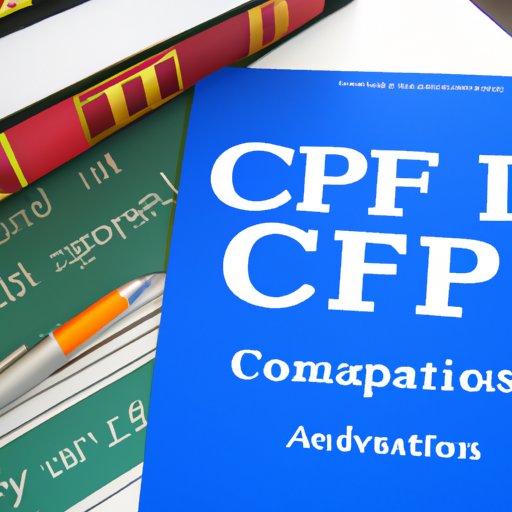Introduction
Financial advisors provide invaluable guidance to individuals as they navigate their financial lives. Many people are interested in becoming financial advisors because of the meaningful work, competitive salary, and potential for career growth. However, an important question that many aspiring financial advisors have is whether or not they need a Certified Financial Planner (CFP) certification to be successful.
A CFP is a professional designation given to those who have completed certain educational, training, and examination requirements as outlined by the CFP Board. A financial advisor, on the other hand, is a general term used to describe any individual who provides financial advice to clients.
Is It Possible to Be a Successful Financial Advisor Without a CFP?
The short answer is yes, it is possible to become a successful financial advisor without a CFP certification. However, having a CFP can give you an edge when competing for jobs and may even open up entirely new opportunities. So, if you’re considering a career as a financial advisor, it’s worth examining the pros and cons of becoming one with or without a CFP.
What Skills Do You Need to Succeed as a Financial Advisor?
Regardless of whether you become a financial advisor with or without a CFP, there are certain skills and qualities you’ll need to succeed. These include:
- Strong communication and interpersonal skills
- Good problem-solving abilities
- An understanding of financial markets and products
- The ability to build trust and relationships with clients
- Organizational and time management skills
- Knowledge of applicable laws and regulations
Examining the Necessity of CFP Certification for Financial Advisors
While having a CFP isn’t necessary to become a financial advisor, it is becoming increasingly common for employers to require it. The CFP is the most widely recognized professional certification for financial advisors, and it demonstrates that you have met the highest standards of competency and ethical practice. Having a CFP can also give you credibility with potential clients, which can help you grow your business.

Understanding the Benefits of Having a CFP When Working as a Financial Advisor
If you decide to pursue a CFP certification, there are several benefits that can come with it. These include:
Increased Professionalism
Having a CFP can help you stand out from the crowd and demonstrate your commitment to professionalism. It shows that you possess a comprehensive understanding of the financial planning process and have the necessary skills to provide quality advice to clients.
Greater Knowledge and Expertise
By earning a CFP, you will gain greater knowledge and expertise in all areas of financial planning, including investments, taxes, estate planning, insurance, and retirement. This can give you the confidence to tackle complex financial issues and provide more comprehensive advice to your clients.
The Ability to Offer Higher Quality Advice
When you have a CFP, you can offer higher quality advice to your clients. This could lead to better client outcomes and improved client satisfaction, which can help you build a successful and rewarding career in financial advising.
Breaking Down the Requirements of Becoming a Financial Advisor with or Without a CFP
The requirements for becoming a financial advisor with or without a CFP vary depending on the state you live in. Generally speaking, however, here is what you can expect:
Education and Training Requirements
To become a financial advisor, you typically need at least a bachelor’s degree in finance, economics, accounting, or a related field. If you want to earn a CFP, you’ll also need to complete specific coursework and pass a comprehensive exam. Additionally, some states may require you to participate in additional training programs.
Licensing Requirements
All financial advisors must be licensed in order to provide services to clients. Each state has its own licensing requirements, but generally speaking, you’ll need to pass an exam and submit a background check. Depending on the type of services you plan to offer, you may need to obtain additional licenses.
Continuing Education Requirements
In order to maintain a valid license, financial advisors must complete continuing education courses each year. This helps ensure that they remain up-to-date on the latest industry developments and best practices.
Conclusion
Becoming a financial advisor is a great way to help others make sound financial decisions. While having a CFP isn’t necessary to become a financial advisor, it can provide you with an advantage when competing for jobs and may even open up entirely new opportunities. Ultimately, the decision of whether or not to pursue a CFP should be based on your individual goals and needs.
(Note: Is this article not meeting your expectations? Do you have knowledge or insights to share? Unlock new opportunities and expand your reach by joining our authors team. Click Registration to join us and share your expertise with our readers.)
